CRITICAL ACCLAIM FOR GREG EGAN
‘One of the genre’s great ideas men’
The Times
‘The universe may be stranger than we can imagine, but it’s going to have a hard time outdoing Egan’
New Scientist
‘Science fiction as it should be’
Odyssey
‘Brilliant. Fantastic, mind-stretching … Revel in it. We’ll not see its like for a while’
Starburst
‘Greg Egan is central to contemporary science fiction’
Interzone
‘Qualifies as grand speculation in the purest sense … stunning’
Locus
‘Greg Egan is the 21st century’s most important SF writer … Read Egan today, because it’s what everybody else will be reading tomorrow’
Stephen Baxter
‘Immensely exhilarating. Sweeps the reader along like a cork on a tidal wave’
Sydney Morning Herald
‘[Greg Egan] reveals wonders with an artistry to equal his audacity’
New York Review of Science Fiction
‘Wonderful, mind-expanding stuff, and well written too’
Guardian
‘In a time when it’s frequently claimed that SF holds no more surprises Egan casts a coldly innovative eye on old themes … Egan’s visions of the future glow with gloomy intellectual fire. Luminous indeed’
Amazon.co.uk
The island was too small for human habitation, and too far from the commonly travelled sea routes to serve as a navigation point, so the people of the Kai and Tanimbar Islands had never had reason to name it. The Javanese and Sumatran rulers who’d claimed tributes from the Spice Islands would have been oblivious to its existence, and Prabir had been unable to locate it on any Dutch or Portuguese chart that had been scanned and placed on the net. To the current Indonesian authorities it was a speck on the map of Maluku propinsi , included for the sake of completeness along with a thousand other uninhabited rocks. Prabir had realised the opportunity he was facing even before they’d left Calcutta, and he’d begun compiling a list of possibilities immediately, but it wasn’t a decision he could make lightly. He’d been on the island for more than a year before he finally settled on a name for it.
He tried out the word on his classmates and friends before slipping it into a conversation with his parents. His father had smiled approvingly, but then had second thoughts.
‘Why Greek? If you’re not going to use a local language … why not Bengali?’
Prabir had gazed back at him, puzzled. Names sounded dull if you understood them too easily. Why make do with a lame Big River, when you could have a majestic Rio Grande? But surely his father knew that. It was his example Prabir was following.
‘The same reason you named the butterfly in Latin.’
His mother had laughed. ‘He’s got you there!’ And his father had relented, hoisting Prabir up into the air to be spun and tickled. ‘All right, all right! Teranesia!’
But that had been before Madhusree was born, when she hadn’t been named herself (except as the much-too-literal Accidental Bulge). So Prabir stood on the beach, holding his sister up to the sky, spinning around slowly as he chanted, ‘Teranesia! Teranesia!’ Madhusree stared down at him, more interested in watching him pronounce the strange word than in taking in the panorama he was trying to present to her. Was it normal to be near-sighted at fifteen months? Prabir resolved to look it up. He lowered her to his face and kissed her noisily, then staggered, almost losing his balance. She was growing heavier much faster than he was growing stronger. His parents claimed not to be growing stronger at all, and both now refused to lift him over their heads.
‘Come the revolution,’ Prabir told Madhusree, checking for shells and coral before putting her down on the dazzling white sand.
‘What?’
‘We’ll redesign our bodies. Then I’ll always be able to lift you up. Even when I’m ninety-one and you’re eighty-three.’
She laughed at this talk of the metaphysically distant future. Prabir was fairly sure that Madhusree understood eighty-three at least as well as he understood, say, ten to the hundredth power. Looming over her, he counted out eight hand flashes, then three fingers. She watched, uncertain but mesmerised. Prabir gazed into her jet-black eyes. His parents didn’t understand Madhusree: they couldn’t tell the difference between the way she made them feel and the way she was. Prabir only understood, himself, because he dimly remembered what it was like from the inside.
‘Oh, you pretty thing,’ he crooned.
Madhusree smiled conspiratorially.
Prabir glanced away from her, across the beach, out into the calm turquoise waters of the Banda Sea. The waves breaking on the reef looked tame from here, though he’d been on enough queasy ferry rides to Tual and Ambon to know what a steady monsoon wind, let alone a storm, could whip up. But if Teranesia was spared the force of the open ocean, the large islands that shielded it — Timor, Sulawesi, Ceram, New Guinea — were invisibly remote. Even the nearest equally obscure rock was too far away to be seen from the beach.
‘For small altitudes, the distance to the horizon is approximately the square root of twice the product of your height above sea level and the radius of the Earth.’ Prabir pictured a right-angled triangle, with vertices at the centre of the Earth, a point on the horizon, and his own eyes. He’d plotted the distance function on his notepad, and knew many points on the curve by heart. The beach sloped steeply, so his eyes were probably two full metres above sea level. That meant he could see for five kilometres. If he climbed Teranesia’s volcanic cone until the nearest of the outlying Tanimbar Islands came into sight, the altitude of that point — which his notepad’s satellite navigation system could tell him — would enable him to calculate exactly how far away they were.
But he knew the distance already, from maps: almost eighty kilometres. So he could reverse the whole calculation, and use it to verify his altitude: the lowest point from which he could see land would be five hundred metres. He’d drive a stake into the ground to mark the spot. He turned towards the centre of the island, the black peak just visible above the coconut palms that rimmed the beach. It sounded like a long climb, especially if he had to carry Madhusree most of the way.
‘Do you want to go see Ma?’
Madhusree pulled a face. ‘No!’ She could never have too much of Ma, but she knew when he was trying to dump her.
Prabir shrugged. He could do the experiment later; nothing was worth a tantrum. ‘Do you want to go swimming, then?’
Madhusree nodded enthusiastically and clambered to her feet, then ran unsteadily towards the water’s edge. Prabir gave her a head start, then pounded across the sand after her, bellowing. She glanced at him disdainfully over her shoulder, fell down, stood up, continued. Prabir ran rings around her as she waded into the shallows, the soles of his feet slapping up water, but he made sure he didn’t get too close; it wasn’t fair to splash her in the face. When she reached little more than waist height, she dropped into the water and started swimming, her chubby arms working methodically.
Prabir froze and watched her admiringly. There was no getting away from it: sometimes he felt the Madhusree-thing himself. The same sweet thrill, the same tenderness, the same unearned pride he saw on his father’s and mother’s faces.
He sighed heavily and swooned backwards into the water, touching bottom, opening his eyes to feel the sting of salt and watch the blurred sunlight for a moment before rising to his feet, satisfyingly wet all over. He shook his hair out of his eyes and then waded after Madhusree. The water reached his own ribs before he caught up with her; he eased himself down and started swimming beside her.
Читать дальше
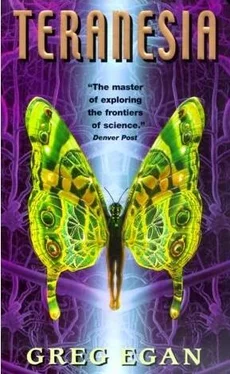

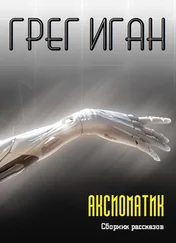
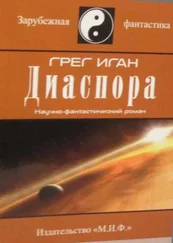
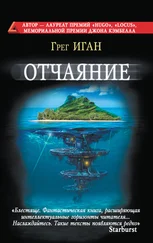
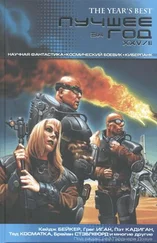
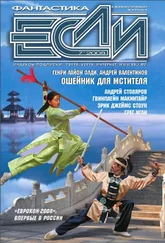


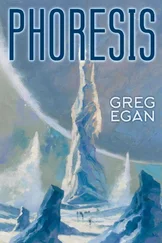
![Грег Иган - Рассказы [компиляция]](/books/419837/greg-igan-rasskazy-kompilyaciya-thumb.webp)
